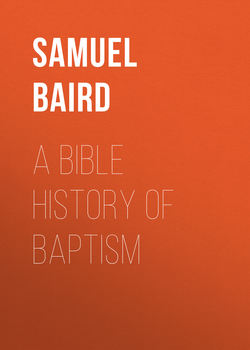Читать книгу A Bible History of Baptism - Baird Samuel John - Страница 14
Book I.
OLD TESTAMENT HISTORY
Part II.
THE VISIBLE CHURCH
Section XI. —The Terms of Membership in the Church of Israel
ОглавлениеWith some slight circumstantial differences, having reference to the difference in the office of the church under the two dispensations, the conditions of membership were essentially the same as propounded at Sinai and as prescribed under the gospel. While the spiritual blessings of the covenant were from the beginning conditioned upon true faith and loving obedience, the privilege of membership in the visible church was at Sinai bestowed upon those, with their households, who made credible profession of these graces, and upon them only. On “the day of the assembly,” all the people professed to take God for their God, and to devote themselves to him as his believing and obedient people. And as on the days of Pentecost, so on this occasion, the profession was accepted, and their admission was sealed with baptism; although doubtless, in both cases, there were false professors included with the true. With certain exceptions, ordained for special reasons (Deut. xxiii, 1-8), the conditions of membership were the same for the Gentile world as for Israel. The law was explicit and most emphatic on this point. “One ordinance shall be both for you of the congregation and also for the stranger that sojourneth with you, an ordinance forever in your generations: as ye are, so shall the stranger be before the Lord. One law and one manner shall be for you and for the stranger that sojourneth with you.” – Num. xv, 14-16, and 29; and see ix, 14; xix, 10; Ex. xii, 43-49; Deut. xxxi, 12; Josh. viii, 33, etc.
For eliminating unworthy members, the means provided in the Sinai ordinances were as abundant as those now enjoyed by the church, and would seem to have been as well adapted to the effectual securing of the end proposed. They come under three heads. (1.) Certain offenses were visited with the penalty of death or of utter separation from the communion of Israel. (Ex. xxxi, 14; Num. ix, 13, etc.) (2.) The expenses incident to a faithful performance of the duties required of members of the church of Israel were large and continual. Firstfruits, firstlings, and tithes, trespass offerings, sin offerings, freewill offerings, and other oblations, made up an aggregate which can not have fallen short of one-fifth of all the income of Israel, and probably went far beyond that amount. The law provided none but moral means for enforcing these requirements; and numerous facts in the history of Israel show that by many they were entirely neglected. (Neh. xiii, 10-13; Mal. iii, 8-10.) Those who thus withheld what belonged to the Lord were self-excluded from the fellowship of the covenant society, and were “cut off from the congregation (ekklēsia from the church) of the Lord.” (3.) The irksome and humiliating nature of the regulations concerning uncleanness and purifying were very efficient means of separating between the believing and the profane. As we shall presently see, occasions of uncleanness were of almost daily occurrence, in every house. These required a conscientious watchfulness and assiduity, in guarding against defilement, and in using the appointed rites of purifying, which often involved the interruption and expense of journeys to the sanctuary and offerings there.
The communion of the church of Israel thus consisted of those only, with their families, who added to the obligations of a public profession of faith, a fidelity to all the requirements of the law, its moral precepts, its ritual observances, its tithes and offerings, its rites of purifying and its annual feasts. In a word, the account given of Zacharias and Elizabeth describes the character required, in order to fellowship in the church of Israel: “Righteous before God, walking in all the commandments and ordinances of the Lord blameless.” – Luke i, 6. Such, and such only, were the clean, to whom the privileges of Israel’s communion belonged. To them they were certified by the seal of baptism.
